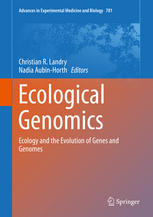

Most ebook files are in PDF format, so you can easily read them using various software such as Foxit Reader or directly on the Google Chrome browser.
Some ebook files are released by publishers in other formats such as .awz, .mobi, .epub, .fb2, etc. You may need to install specific software to read these formats on mobile/PC, such as Calibre.
Please read the tutorial at this link: https://ebookbell.com/faq
We offer FREE conversion to the popular formats you request; however, this may take some time. Therefore, right after payment, please email us, and we will try to provide the service as quickly as possible.
For some exceptional file formats or broken links (if any), please refrain from opening any disputes. Instead, email us first, and we will try to assist within a maximum of 6 hours.
EbookBell Team

4.1
90 reviewsResearchers in the field of ecological genomics aim to determine how a genome or a population of genomes interacts with its environment across ecological and evolutionary timescales. Ecological genomics is trans-disciplinary by nature. Ecologists have turned to genomics to be able to elucidate the mechanistic bases of the biodiversity their research tries to understand. Genomicists have turned to ecology in order to better explain the functional cellular and molecular variation they observed in their model organisms.
We provide an advanced-level book that covers this recent research and proposes future development for this field. A synthesis of the field of ecological genomics emerges from this volume. Ecological Genomics covers a wide array of organisms (microbes, plants and animals) in order to be able to identify central concepts that motivate and derive from recent investigations in different branches of the tree of life.
Ecological Genomics covers 3 fields of research that have most benefited from the recent technological and conceptual developments in the field of ecological genomics: the study of life-history evolution and its impact of genome architectures; the study of the genomic bases of phenotypic plasticity and the study of the genomic bases of adaptation and speciation.